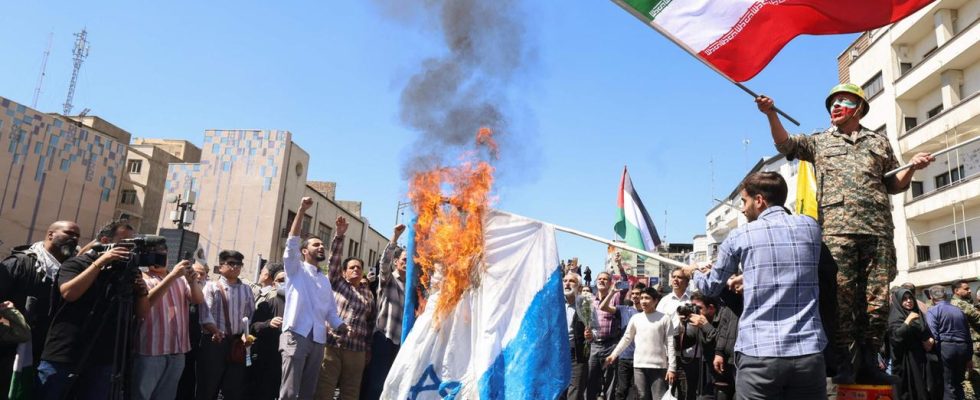background
Iran and Israel have been hostile to each other for decades, but only now have they come to direct confrontation. A chronicle of stealth attacks and shadow wars.
Iran made good on its threat at the weekend and attacked Israel directly for the first time. Tehran justifies the attack with an attack on the Iranian embassy compound in the Syrian capital Damascus, for which Israel is said to be responsible. Israel has neither confirmed nor denied responsibility for the attack, in which seven officers of the Iranian Revolutionary Guard died, some of them high-ranking officers.
The conflict between Israel and Iran dates back decades, the two states are the bitterest enemies in the region and have a long history of shadow wars and stealth attacks on land, sea, air and cyberspace.
1979: The Shah is overthrown
The pro-Western and US-backed ruler in Iran, Mohammad Reza Shah Pahlavi, is overthrown in the course of the Islamic Revolution. The Shah came to the throne in 1941 and viewed the State of Israel, founded in 1948, as an ally. After the revolution, Ayatollah Ruhollah Khomeni, who returned from exile in France, founded the Islamic Republic of Iran. From now on, enmity against Israel is mandatory.
Ayatollah Ruhollah Khomeni returned from exile to found the Islamic Republic.
1982: The birth of Hezbollah
Israel’s military invades its northern neighbor Lebanon. There, Hezbollah (Party of God) developed from a small Shiite group to an influential force beyond Lebanon during the civil war from 1975 to 1990. The Iranian Revolutionary Guards founded the Hezbollah militia in 1982 to export their Islamic revolution. The aim is also to push back the Israeli military. Israel ultimately sees the militia as the most dangerous enemy on its borders.
1983: Israel’s military in retreat
Iran-backed Hezbollah uses suicide bombings to drive Western and Israeli forces out of Lebanon. In November, a car packed with explosives drives into the Israeli military headquarters. Israel later withdraws from large parts of Lebanon.
1992 and 1994: Terror against Jews in South America
During the two years there were suicide attacks on the Israeli embassy and a Jewish center in Buenos Aires. Dozens of people are killed. Argentina and Israel accuse Iran and Hezbollah of being behind the attacks. Both deny any responsibility.
2002: Is Iran building a nuclear bomb?
The revelation that Iran is running a secret uranium enrichment program is sparking fears that the Islamic Republic could try to build a nuclear weapon. Iran denies this. Israel itself is internationally considered one of the de facto nuclear powers, but has never officially confirmed its possession of nuclear weapons. The country has not signed the Nuclear Non-Proliferation Treaty, which provides for the non-proliferation of nuclear weapons.
2006: Second attempt in Lebanon fails
The Israeli military is fighting a months-long war against Hezbollah in Lebanon. However, it cannot defeat the heavily armed militia and withdraws its troops.
Hezbollah fighters carry the coffin of one of their comrades.
2010: Hacker attack on Iran
“Stuxnet”, a computer virus allegedly developed by the USA and Israel, is being used to attack the uranium enrichment plant in Natans, Iran. It is the first publicly known cyber attack on an industrial facility.
2012: Nuclear researcher is killed
Iranian nuclear scientist Mostafa Ahmadi-Roshan is killed in Tehran by a bomb planted on his car by a motorcyclist. The authorities blame Israel for the attack.
Benjamin Netanyahu, Prime Minister of Israel, shows a picture of an alleged Iranian nuclear storage facility during his speech to the UN General Assembly.
2018: Attacks on Syria and the Golan
US President Donald Trump is withdrawing from the nuclear deal with Iran. Israeli Prime Minister Benjamin Netanyahu had fought the international agreement for years. He calls Trump’s decision “a historic step.” In May, Israel said it was attacking Iranian military infrastructure in Syria. Iranian forces fired rockets from Syrian soil into the Israeli-occupied Golan Heights.
2020: US kills Iranian general
Israel welcomes the targeted killing of General Qassem Soleimani by a US drone strike in the Iraqi capital Baghdad. Soleimani was the commander of the Quds Force, a special foreign operations unit of the Iranian Revolutionary Guard. Iran retaliates with missile attacks on Iraqi bases where US troops are stationed. About 100 US soldiers are injured.
US President Donald Trump speaks at the start of the UN Security Council meeting in New York.
2021: Another nuclear expert dies
Iran blames Israel for the assassination of Mohsen Fakhrisadeh, who was seen by Western intelligence agencies as the mastermind of a secret Iranian program to develop nuclear weapons. The government in Tehran has long denied such ambitions.
2022: Biden makes his stance clear
US President Joe Biden and Israeli Prime Minister Yair Lapid sign a joint declaration of commitment to reject Iranian nuclear weapons. The allies, who have long been divided over diplomacy towards Iran, are now demonstrating their unity. The pledge comes a day after Biden told a local television station he was open to using force against Iran as a “last resort” – a move to address Israel’s demands for a “credible military threat.”
2024: First direct attack on Israel
Seven Revolutionary Guard officers, including two senior commanders, were killed in a suspected Israeli airstrike on the Iranian embassy compound in Damascus on April 1. Iran threatens Israel with retaliation. On the night of April 13th to 14th, Iran fired more than 300 drones and missiles towards Israel, but according to Israeli information, 99 percent of them were intercepted.

